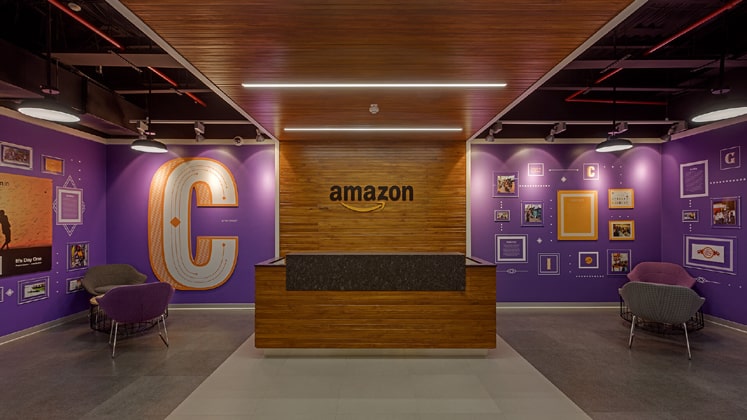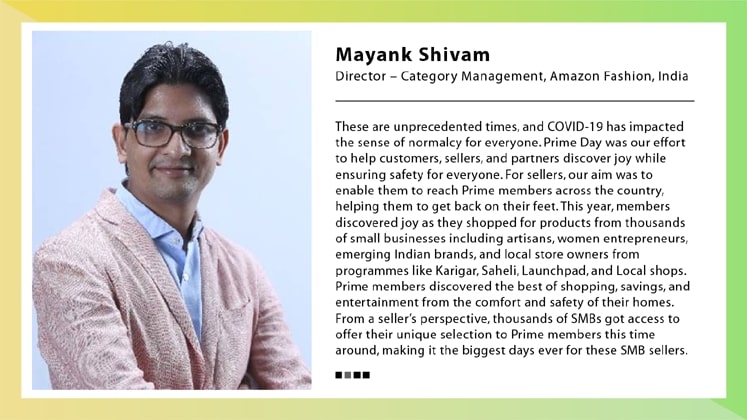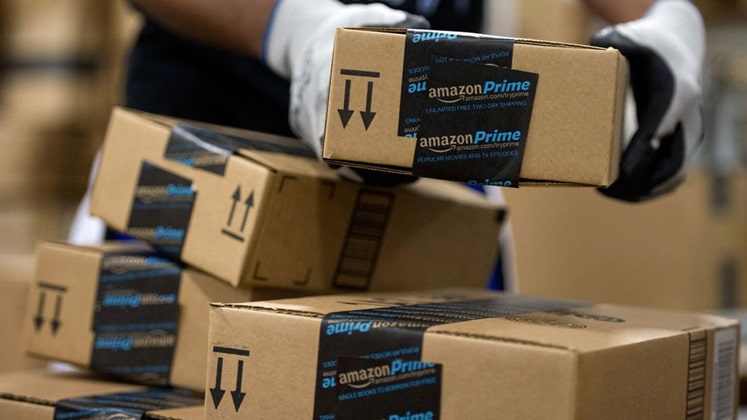COVID-19 and the subsequent complete as well as partial lockdowns have deterred, among every other segment, the fashion retail sector in a drastic way. The pandemic has changed the way the world works, and consumer buying behaviour too has gone under transformation. Personal hygiene and social distancing have become the norm. While all of these conditions have affected the overall fashion retail industry, much to the surprise of everyone, fashion e-commerce segment has been witnessing a good pick-up since the initial phases of Unlock in the country. With more consumers coming online to shop for their fashion needs (along with other needs), the pandemic seems to have become a sort of inflexion point for the e-commerce industry in India.
According to GlobalData, a London-based data analytics firm, the e-commerce market in India is set to grow at a compound annual growth rate (CAGR) of 19.6 per cent between 2019 and 2023 and the coronavirus pandemic will accelerate the growth of India’s e-commerce market to Rs. 7 trillion by 2023. In the times to come, fashion brands that are more dependent on physical stores will have to focus on online retail.
With such stats, online commerce major Amazon has found itself rightly positioned to take over the market and convert the industry’s misfortune into its big opportunity and while at it, the e-commerce giant is ensuring to bring back the stalled businesses of many small sellers and brands. Talking about the ongoing crisis, Jeff Bezos, Founder & CEO, Amazon, had said in his shareholder letter, “Although these are incredibly difficult times, they are an important reminder that what we do as a company can make a big difference in people’s lives. Customers count on us to be there and we are fortunate to be able to help. With our scale and ability to innovate quickly, Amazon can make a positive impact and be an organising force for progress.”
The crisis & the bounce back plan
Even as many large traditional retailers are announcing huge lay-offs and store closures due to the pandemic, it has in contrast giving e-commerce a major boost. According to Kantar Consulting Group, international e-commerce grew 41 per cent in only 3 months compared with 22 per cent growth for 2020 as a whole to date. India is similarly not untouched by this development.
With transformed retail habits, Mayank Shivam, Director – Category Management, Amazon Fashion, India, tells Apparel Resources, “We are humbled by the customer response and geared to meet the pent-up demand for priority products that customers need over a prolonged period of lockdown. With respect to fashion, we are seeing an immediate spike in apparel – essential clothing such as innerwear for men, women and kids. Besides, comfortwear has seen a massive spike across genders and kidswear. There has also been an increased demand for maternitywear and new-born apparel. In light of the current pandemic, customers are adopting safety products and we have seen the demand for masks multiply week on week. We remain committed as always to ensuring the safety of our customers and we believe e-commerce is the best way to deliver a wider selection of products while upholding the tenets of safety and social distancing.”
Amazon Fashion India has continued to accelerate its brand associations from bringing in global brands like Under Armour, Kate Spade, etc. to working with top global and Indian brands like Mothercare, Adidas, Puma, Fossil, Casio, UCB, Levis, Amrapali, Hidesign, Michael Kors, Armani, Diesel, or celebrity led brands like Rheson, NUSH, PROWL, One8 Kohli and Just F, to name a few. With these offerings, Amazon has consistently remained customer-obsessed and has been offering them the most exciting range of fashion and accessories, which further helped the brand bring back the consumers looking for ‘revenge buying’ after the lockdown was lifted.
Today, the online marketplace has different category stores on its website, making the online shopping experience lot easier and more seamless. Amazon has its all-new dedicated Mask store offering over 500 cloth masks from over 35 sellers; Designer Boutique (DBA) offering the largest curation of designer wear from over 279 emerging and celebrated designers; Plus Size store offering curated selection across 45+ brands; Essentials store for men and women highlighting everyday essentials which include lingerie, activewear, ethnicwear, workwear and nightwear; and Winter Wear store offering styles and winter trends for the season among other dedicated sections.
“As we build our business, we continue to obsess over four key customer pain points including choice, ease of shopping, speed of delivery, and an easy returns experience, and have built technology solutions, many of which are India-first, to change the way India shops for fashion. For us, apparel fashion is a very fundamental need for our customers. The sense of fashion might have changed during the current times; people have started shopping more for comfortwear since there are lesser opportunities of going out or socialising, but we have definitely seen an increase in the online sales in fashion category. Right now, what offline and online players need is to be nimble enough or responsive enough to serve these customers,” asserts Mayank.
Also Read: Reaching out to customers in the new normal
Sustaining small businesses
Besides offering best of product mix to its customer base, Amazon has taken it to itself to help its huge sellers and brands community to sustain their businesses during the current times. In January this year when Jeff Bezos visited the country, the company made two important commitments for India – (1) an investment of US $ 1 billion towards bringing 10 million SMBs online by 2025 and enabling exports worth US $ 10 billion and (2) create 1 million new jobs by 2025.
“We have consistently innovated for India through these years –creating seller-friendly initiatives like seller-flex & easy ship, launching the lightweight Micron app, working with local eco-system for last mile through IHS and Amazon Easy programmes and launching Hindi interface. Our most recent program Local Shops is another example that helps customers as well as the small kiranas in the neighbourhood. This is what has helped us deliver to 100 per cent of pin codes in India and become the most trusted online shopping site for multiple years. We will continue to invest in innovation that allows our tech to scale for growing needs of our customer as well as Indian small business partnering with us in so many ways,” elaborates Mayank. Amazon’s strong network of sellers and brands and its ready strategies to bring onboard more sellers are on steroids right now, helping the firm take up majority share of the fashion segment reeling from the impact of coronavirus.
There has been a 50 per cent increase in new seller registrations on Amazon versus the pre COVID-19 times. Mayank says, “We have a responsibility at this point of time. We want to save life and livelihood and with the opening of e-commerce now, we are working on getting our six lakh sellers that we have on Amazon Fashion back into business and we have taken some very specific initiatives to support some of our small sellers. For example, we enabled ‘on-demand disbursement’ feature that enables sellers to get their disbursements daily. We also have brought various kinds of fee waivers to help sellers navigate the economic challenges during these critical times. These and many other such enabling programmes are helping our sellers to run their businesses successfully.”
In line with this, Amazon Fashion India has recently entered into a partnership with leading value fashion retailer Easybuy wherein Amazon Fashion will offer 2,000+ styles by the retail brand for the next 6 months and to further its commitment with Amazon Fashion, Easybuy will create online-only brands which will be especially manufactured for the existing categories. Easybuy has identified SMEs and built a supply chain system through nurturing them, further enabling SMEs to grow along with both Easybuy and Amazon Fashion.
All with safety & precautionary measures
While sustaining businesses, Amazon has been keeping up with all the safety and precautionary measures to keep the overall operations safe and convenient. Amazon has made over 100 significant process changes in its operations network and is conducting daily audits of these measures. “Safety of our teams continues to be our top priority. We are working closely with authorities to ensure we are taking the right precautions and have implemented a series of preventative health measures for employees, associates and partners at our sites. We’ve distributed face masks and implemented temperature checks at sites around the world to help protect employees and support staff. We regularly sanitise door handles, stairway handrails, lockers, elevator buttons, and touch screens, and disinfectant wipes and hand sanitiser are standard across our network. We maintain social distancing norms in all the operations and many other precautionary steps,” maintains Mayank.
Amazon is also encouraging hundreds of thousands of small businesses across the country to use digital payment option with Amazon Pay.
While its difficult to screen the sellers onboarding the Amazon platform, the e-commerce major has introduced lots of technology solutions to keep onboarding the sellers or brands. While Amazon in the US is vetting a new programme in order to screen new sellers and merchants through video conferencing, its India arm too has invested heavily to ensure the policy against the sale of counterfeit products is followed. “We employ dedicated teams of software engineers, research scientists, programme managers, and investigators to operate and continually refine our anti-counterfeiting programme. In India, over the past 12 months, we have introduced three tech-based innovations – Brand Registry, Transparency, and Project Zero to prohibit counterfeits,” tells Mayank.
The way ahead
The country is still reeling under the pandemic and while the economy cannot be put on hold for long, the retail industry has found e-commerce as the way ahead. According to a study by Kantar, the consumer base of e-commerce shoppers has doubled to 42 per cent of urban active internet users in India over the last few months and nearly 50 per cent of these are new users of e-commerce coming from tier-II and tier-II towns and Amazon has emerged as the preferred and trusted shopping destination for most of them.










